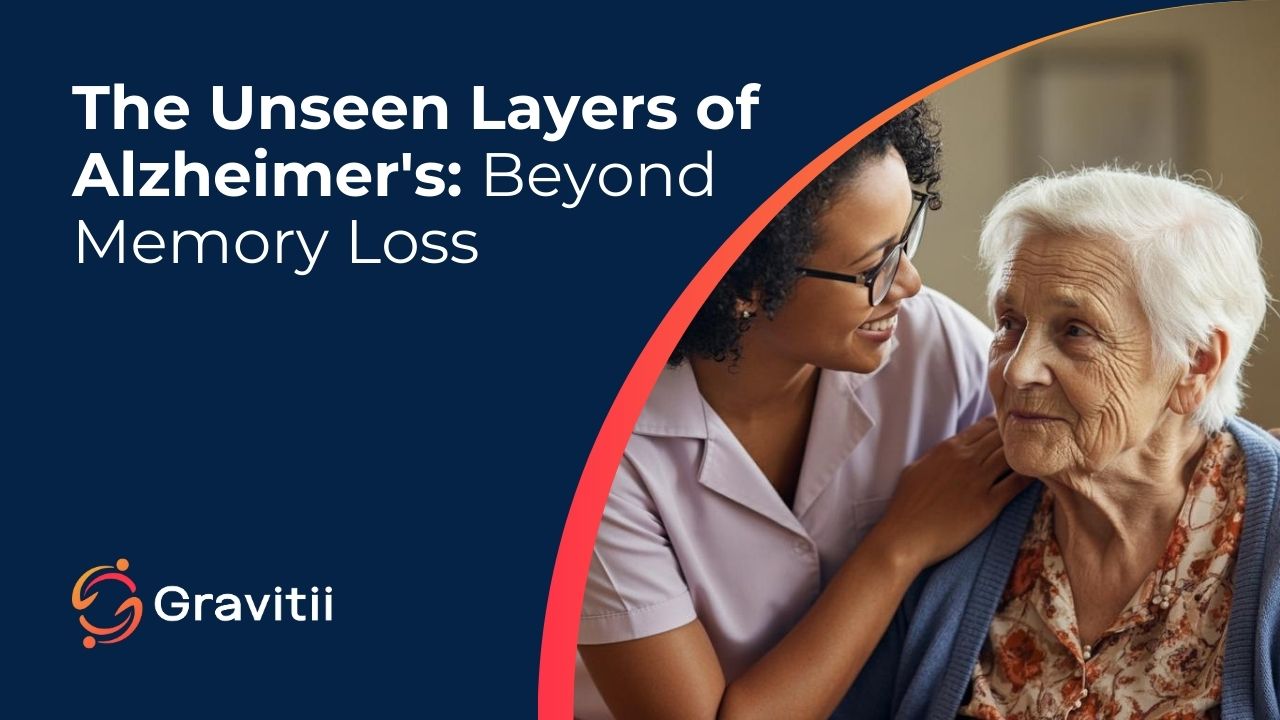Alzheimer’s disease—just the mention of it can evoke a sense of fear and apprehension. While it’s commonly recognized for its devastating impact on memory, there are layers of this condition that many may not fully understand. To provide a more comprehensive view, let’s explore some of the key aspects of Alzheimer’s, gaining insights into its early symptoms, brain changes, preventive measures, and the profound effects in its later stages.
The Subtle Early Signs: More Than Just Memory Loss
When people think of Alzheimer’s, memory loss immediately comes to mind. However, the early symptoms of Alzheimer’s extend beyond just forgetfulness. These symptoms can weave into daily life in subtle yet significant ways.
Confusion with daily tasks is an early sign that often goes unrecognized. Imagine struggling to follow a favourite recipe or getting lost driving on a familiar route home. Language difficulties also serve as a common early indicator; finding the right words or following a conversation may become increasingly challenging. Changes in behaviour are another tell-tale sign, with individuals displaying uncharacteristic irritability or withdrawing from social activities they once enjoyed.
Understanding these subtler symptoms can foster empathy and early intervention, enabling affected individuals and their families to seek help sooner.
“In the early stages of Alzheimer’s, it’s often about recognizing subtle changes in memory, like misplacing items or forgetting appointments, which are sometimes dismissed as normal aging.” – Interview with Dr. Alison Nakanishi
Brain Changes and the Progression of Alzheimer’s
The journey of Alzheimer’s begins deep within the hippocampus, the brain’s memory center. It’s here that the earliest signs of trouble often originate, hindering the formation of new memories. As the disease progresses, it spreads to other regions of the brain, gradually affecting various cognitive functions.
This spread explains the worsening symptoms over time. Initially, short-term memory issues surface, but as Alzheimer’s advances, it reaches areas governing language, reasoning, and eventually, physical functioning. Visualizing this progression underscores the importance of early detection and intervention.
“It’s important to approach progression with a team mindset, involving family, caregivers, and healthcare professionals to adapt care plans as the needs of the patient change.” – Interview with Dr. Alison Nakanishi
Prevention Efforts Without Pharmaceuticals
While there is no known cure for Alzheimer’s, certain lifestyle choices may help reduce the risk or delay the onset of symptoms. Embracing non-pharmaceutical prevention strategies can be empowering.
- Physical Activity: Regular exercise has been shown to foster brain health by improving blood flow and reducing inflammation.
- Balanced Diet: Diets rich in fruits, vegetables, whole grains, and lean proteins, such as the Mediterranean diet, may benefit brain function.
- Mental Stimulation: Engaging in activities that challenge the brain—like puzzles, reading, or learning new skills—can help build cognitive reserve.
- Social Engagement: Maintaining strong social connections and engaging in meaningful conversations can contribute to mental well-being.
- Good Sleep Hygiene: Quality sleep is crucial for brain health, as it allows the brain to heal and regenerate.
“It’s about promoting overall brain health through lifestyle choices that also support cardiovascular health, as a healthy heart and healthy brain are closely linked.” – Interview with Dr. Kevin
The Heart-Wrenching Reality of Late-Stage Alzheimer’s
In its severe stages, Alzheimer’s leads to significant brain tissue shrinkage. Individuals increasingly lose their cognitive abilities and become entirely dependent on others for care. This stage can be incredibly difficult for both the affected individual and their loved ones.
The stark reality of late-stage Alzheimer’s underscores the critical need for ongoing research and support for early interventions. Raising awareness and fostering a deeper understanding can help mobilize resources toward finding solutions.
“You must start living in their reality. Your reality is done, you checked that at the door. It’s time to help somebody else.” – Interview with Naomi Mison
Final Thoughts: Nurturing Compassion and Community
Alzheimer’s disease is more than a medical condition—it’s a profound human challenge that touches countless lives. By understanding its complexities and embracing preventative measures, we can offer more compassionate support to those affected. Our community, bound by dignity and innovation, plays a crucial role in this journey.
As we look to the horizon, let’s remember the importance of fostering an environment where those living with Alzheimer’s feel valued and supported. Together, as a community, we can continue to push boundaries, seeking new ways to improve care and, ultimately, inch closer to a world without Alzheimer’s.
At Gravitii, we’re committed to supporting families navigating Alzheimer’s and dementia care. Whether you’re seeking professional assistance or simply need resources to guide your journey, we’re here to help.
Ready to learn more about personalized caregiving solutions? Sign up for free now and take the first step toward compassionate, informed care.

